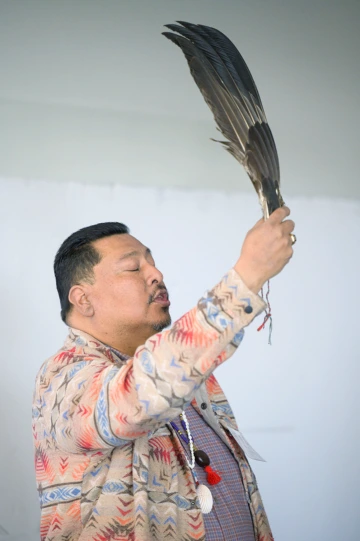Taking Care
The INCATS program is helping Native students attend nursing school and bring care back to their communities.

Traditional healer and counselor Miguel Flores gives a blessing at an INCATS summit.
INCATS
Emily Si’al, a citizen of the Tlingit and Haida Nations of Southeast Alaska, understands the challenges Native American communities face in accessing quality health care. She has seen firsthand how patients often travel long distances for basic care, manage chronic illnesses with rotating providers, and struggle with cultural barriers in systems unfamiliar with their way of life.
Now, as the research program coordinator for the University of Arizona’s Indians in Nursing: Career Advancement and Transition Scholars Program (INCATS), Si’al is working to change that.
INCATS empowers Native American nurses to serve their communities while creating new career pathways for Indigenous youth. The program also addresses the national nursing shortage and the underrepresentation of Native professionals in the field — Native Americans and Alaska Natives make up just 0.4% of the nursing workforce.
Si’al emphasizes the impact of culturally connected care. “There’s a sense of comfort and of trust there — an understanding of cultural practices and a shared experience and history, both of the historical trauma and of resilience.” She adds, “People in tribal communities light up when they’re treated by other Native Americans.”
Since its launch in 2019, INCATS has graduated 10 nurses who are now working in tribal communities — including the Navajo and Tohono O’odham Nations — where they play a vital role in improving health outcomes and building long-term relationships.
Unlike many temporary providers, INCATS-trained nurses remain embedded in the communities they serve. “A lot of those communities are on islands,” says Si’al, speaking about rural southeast Alaska. “It’s hard to get to health care. Then the providers who do come might be there for six months or a year, and then they’re gone.” The same pattern is seen in rural areas of Arizona.
The program is designed to remove barriers to education and retention. Students receive full tuition coverage, living stipends, mentorship, tutoring and professional development. Many begin their coursework at community colleges before transferring to the University of Arizona, helping reduce costs and support success.
This long-term, culturally grounded approach aims to improve outcomes in Indigenous communities, which continue to experience disproportionate rates of preventable illness. According to the Indian Health Service, Native Americans have a life expectancy 4.4 years lower than the general U.S. population and face significantly higher mortality rates from chronic diseases like cirrhosis, diabetes, and cancer.
Si’al believes Indigenous providers are uniquely positioned to lead change. “Much of the disparity stems from the disruption of traditional Indigenous health systems, which are grounded in community, culture, spirituality, and traditional foods,” she says. “Loss of traditional Indigenous ways of life is part of the underlying problem; reclaiming those ways offers an evidence-based solution to our current health crises.”
And for the next generation, representation matters. “Many have told us they’ve never encountered a Native doctor or nurse before,” Si’al says. “Or they didn’t have family members who went to college, so they never imagined it was possible for them. Seeing others overcome similar barriers is inspiring.”
